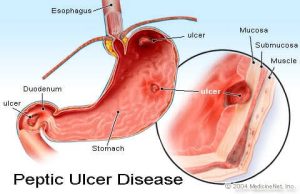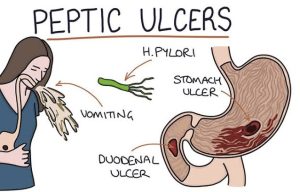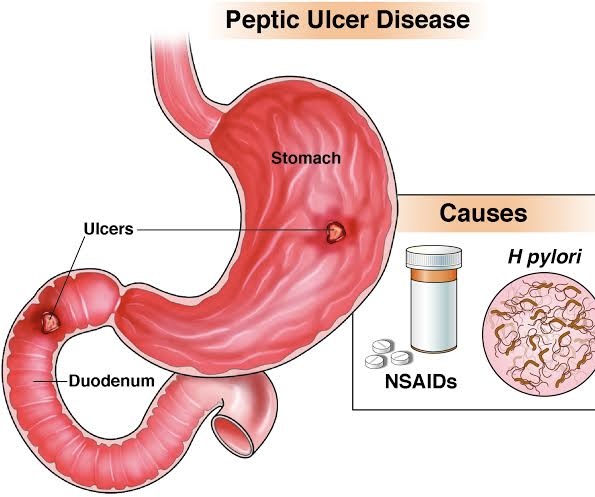As I stood at the edge of the “Burning Abyss”, I felt the weight of my peptic ulcer’s relentless assault on my stomach. But then, like a beacon of hope, my doctor’s words pierced the darkness: “There is a way out.” With a newfound sense of determination, I embarked on a journey of healing, armed with a arsenal of medical treatments. The first doses of medication were like a soothing rain, calming the fiery storms within me.
As the treatments took hold, the “Burning Abyss” began to recede, its flames dwindling to a gentle flicker. My stomach, once a battleground, slowly transformed into a haven of comfort. I savored each pain-free moment, each delicious bite, with gratitude and wonder. The medications worked their magic, healing the wounds, quenching the fires, and restoring balance to my digestive universe. And I, once a prisoner of pain, began to break free.
With each passing day, my strength and vitality returned, like a master chef crafting a culinary masterpiece. Flavors exploded on my palate, a symphony of sweet and savory delights. The “Burning Abyss” was no more, replaced by a sense of renewal and joy. I devoured life with abandon, each morsel a testament to the power of medical treatments and the human spirit’s capacity to heal. And as I looked back into the abyss, I knew I’d never again be held captive by its fiery depths – I was free, and my taste buds rejoiced!
What is Peptic Ulcer?

A peptic ulcer is a sore that develops on the inside lining of the stomach or the first part of the small intestine (duodenum). It occurs when the protective mucous layer of the stomach or intestine is eroded, allowing stomach acid and digestive enzymes to damage the underlying tissue.
There are two main types of peptic ulcers:
1. Gastric ulcer: occurs in the stomach
2. Duodenal ulcer: occurs in the duodenum (first part of the small intestine)
Causes
Infectious Causes:
1. Helicobacter pylori (H. pylori) bacterial infection: The most common cause of peptic ulcers.
Non-Infectious Causes:
1. Long-term use of Nonsteroidal Anti-Inflammatory Drugs (NSAIDs): Pain relievers like aspirin, ibuprofen, and naproxen can irritate the stomach lining.
2. Excessive Alcohol Consumption: Alcohol can irritate the stomach lining and increase acid production.
3. Smoking: Smoking can reduce blood flow to the stomach lining and increase acid production.
4. Stress: Stress can increase acid production and worsen symptoms.
5. Family History: Genetic predisposition can play a role in developing peptic ulcers.
Other Factors:
1. Older Age: Risk increases with age.
2. Certain Medications: Steroids, anticoagulants, and some antidepressants can increase the risk.
3. Spicy or Acidic Foods: While not a direct cause, these foods can irritate the stomach lining and worsen symptoms.
4. Other Medical Conditions: Certain conditions, like Crohn’s disease, ulcerative colitis, and liver disease, can increase the risk.
It’s important to note that while these factors can contribute to the development of peptic ulcers, they may not be present in every case. If you’re experiencing symptoms, consult a healthcare professional for proper diagnosis and treatment.
Pathophysiology

1. Mucosal Barrier Disruption: The stomach’s mucosal lining is damaged, allowing acid and enzymes to come into contact with the underlying tissue.
2. Acid Production: The stomach produces excess acid, which further irritates the damaged mucosa.
3. Pepsin Activation: Pepsin, a digestive enzyme, is activated by acid and breaks down the mucosal tissue.
4. Helicobacter pylori (H. pylori) Infection: H. pylori bacteria colonize the stomach, causing chronic inflammation and further damaging the mucosa.
5. Inflammation and Immune Response: The immune system responds to the infection, leading to inflammation and tissue damage.
6. Gastric Juice Imbalance: The balance between acid, pepsin, and bicarbonate is disrupted, leading to an acidic environment that favors ulcer formation.
7. Mucosal Blood Flow Reduction: Blood flow to the mucosa is reduced, impairing the delivery of oxygen and nutrients, and worsening tissue damage.
8. Ulcer Formation: The combination of acid, pepsin, and inflammation leads to the formation of an ulcer, which can deepen and penetrate the stomach or duodenal wall.
This complex process ultimately leads to the development of a peptic ulcer, characterized by:
– Gastric or duodenal mucosal damage
– Ulcer crater formation
– Inflammation and scarring
– Potential complications like bleeding, perforation, or obstruction
Signs and Symptoms
1. Abdominal Pain: Burning, aching, or gnawing pain in the upper abdomen
2. Nausea and Vomiting: Feeling queasy or vomiting, which may relieve pain temporarily
3. Loss of Appetite: Reduced interest in food due to pain or discomfort
4. Weight Loss: Unintentional weight loss due to reduced appetite or difficulty eating
5. Bloating and Gas: Feeling uncomfortably full or gassy
6. Blood in Stool or Vomit: Black, tarry stools or bloody vomit (in severe cases)
7. Indigestion and Heartburn: Frequent or severe indigestion and heartburn
8. Regurgitation of Food: Food flowing back up into the mouth
9. Dyspepsia: Persistent or recurring stomach upset
10. Anemia: Iron deficiency anemia due to chronic blood loss
11. Fatigue and Weakness: Feeling tired or weak due to chronic illness
12. Belching and Bloating: Excessive belching and bloating
13. Abdominal Tenderness: Pain or discomfort when touching the abdomen
14. Loss of Taste: Reduced sense of taste due to chronic inflammation
15. Difficulty Swallowing: Trouble swallowing food or feeling like food is stuck in the throat
Keep in mind that not everyone will experience all of these symptoms, and some may have additional symptoms not listed here. If you’re experiencing any of these symptoms, consult a healthcare professional for proper diagnosis and treatment.
Risk Factors
1. Infection with Helicobacter pylori (H. pylori): Bacterial infection is a major risk factor.
2. Long-term use of Nonsteroidal Anti-Inflammatory Drugs (NSAIDs): Pain relievers like aspirin, ibuprofen, and naproxen can irritate the stomach lining.
3. Excessive Alcohol Consumption: Alcohol can irritate the stomach lining and increase acid production.
4. Smoking: Smoking can reduce blood flow to the stomach lining and increase acid production.
5. Family History: Genetic predisposition can play a role in developing peptic ulcers.
6. Older Age: Risk increases with age, especially after 60.
7. Steroid Use: Long-term use of steroids can increase the risk.
8. Anticoagulant Medications: Blood thinners like warfarin can increase the risk.
9. Certain Medical Conditions: Conditions like Crohn’s disease, ulcerative colitis, and liver disease can increase the risk.
10. Stress: Physical or emotional stress can exacerbate symptoms.
11. Diet: Consuming spicy, acidic, or fatty foods can irritate the stomach lining.
12. Obesity: Being overweight or obese can increase the risk.
13. Previous Ulcer History: Having a previous peptic ulcer increases the risk of developing another one.
14. Certain Foods: Consuming foods that trigger acid production, like citrus fruits or tomatoes, can increase the risk.
15. Hormonal Changes: Hormonal fluctuations during pregnancy or menopause can increase the risk.
Remember, having one or more of these risk factors doesn’t guarantee you’ll develop a peptic ulcer. If you’re concerned, consult a healthcare professional for personalized advice.
Prevention
Lifestyle Changes:
1. Quit Smoking: Smoking increases the risk of peptic ulcers.
2. Limit Alcohol: Excessive alcohol consumption can irritate the stomach lining.
3. Manage Stress: Stress can exacerbate symptoms; practice stress-reducing techniques like meditation or yoga.
Dietary Modifications:
1. Avoid Trigger Foods: Identify and avoid foods that trigger symptoms, such as spicy or acidic foods.
2. Eat Smaller Meals: Reduce symptoms by eating smaller, more frequent meals.
3. Increase Fiber: A high-fiber diet can help reduce symptoms.
Medical Interventions:
1. Antibiotics: Eradicate H. pylori bacteria with antibiotics.
2. Acid-Reducing Medications: Use medications like antacids, histamine-2 blockers, or proton pump inhibitors to reduce acid production.
3. Cytoprotective Agents: Use medications that protect the stomach lining, such as sucralfate or misoprostol.
Additional Tips:
1. Maintain a Healthy Weight: Obesity can increase the risk of peptic ulcers.
2. Avoid NSAIDs: Limit use of nonsteroidal anti-inflammatory drugs (NSAIDs) like aspirin or ibuprofen.
3. Get Regular Check-Ups: Regular health check-ups can help detect and prevent peptic ulcers.
By following these prevention strategies, you can reduce your risk of developing peptic ulcers and alleviate symptoms if you already have one.
Treatment and management of Peptic Ulcer
Medical Interventions:
1. Antibiotics: Eradicate H. pylori bacteria with antibiotics.
2. Acid-Reducing Medications: Use medications like antacids, histamine-2 blockers, or proton pump inhibitors to reduce acid production.
3. Cytoprotective Agents: Use medications that protect the stomach lining, such as sucralfate or misoprostol.
4. Antacids: Neutralize stomach acid with antacids like Tums, Rolaids, or Mylanta.
Lifestyle Modifications:
1. Quit Smoking: Smoking increases the risk of peptic ulcers.
2. Limit Alcohol: Excessive alcohol consumption can irritate the stomach lining.
3. Manage Stress: Stress can exacerbate symptoms; practice stress-reducing techniques like meditation or yoga.
4. Maintain a Healthy Weight: Obesity can increase the risk of peptic ulcers.
Dietary Changes:
1. Avoid Trigger Foods: Identify and avoid foods that trigger symptoms, such as spicy or acidic foods.
2. Eat Smaller Meals: Reduce symptoms by eating smaller, more frequent meals.
3. Increase Fiber: A high-fiber diet can help reduce symptoms.
4. Avoid Caffeine and Carbonated Drinks: These can irritate the stomach lining.
Additional Tips:
1. Monitor Progress: Regularly monitor symptoms and adjust treatment as needed.
2. Follow Medication Regimens: Adhere to medication schedules and dosages.
3. Attend Follow-Up Appointments: Regular health check-ups can help prevent complications.
By combining medical interventions, lifestyle modifications, and dietary changes, you can effectively manage and treat peptic ulcers, reducing symptoms and preventing complications.

